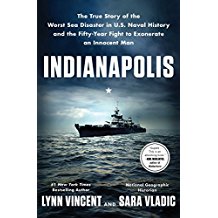 Indianapolis: The True Story of the Worst Sea Disaster in U.S. Naval History and the Fifty-Year Fight to Exonerate an Innocent Man (that title is a mouthful) by Lynn Vincent is an excellent story of a World War II naval disaster that you may never have heard of. If you are a fan of World War II history, or military history in general, I highly recommend it.
Indianapolis: The True Story of the Worst Sea Disaster in U.S. Naval History and the Fifty-Year Fight to Exonerate an Innocent Man (that title is a mouthful) by Lynn Vincent is an excellent story of a World War II naval disaster that you may never have heard of. If you are a fan of World War II history, or military history in general, I highly recommend it.
The Indianapolis was the ship that was chosen to deliver the nuclear weapons that were used to help end World War II to Japan. After the ship made its top secret delivery, it was sunk by an enemy submarine. The captain was court-martialed, his career was destroyed, and the survivors felt that the whole situation was unjust. The captain was finally exonerated about 75 years later, after most of the survivors had already passed away. Indianapolis is the story of the delivery, the sinking, the destruction of Captain Charles McVay, and finally, his redemption.
I first heard of the Indianapolis last year, when I read Bill O’Reilly’s Killing the Rising Sun, which is another excellent book on World War II. Although that book focused on the war in Japan in general, I remember reading about the fate of the Indianapolis (and its captain) and thought that it was really sad. When I had the opportunity to read Lynn Vincent’s book on this ship in exchange for an honest review, I jumped at the chance.
Indianapolis tells the story of the ship from before the delivery of the atomic weapons to Captain McVay’s absolution. It tells about how the crew dealt with the sinking ship. It tells about how the crew fought off sharks, dealt with dehydration and hunger, and tried to keep from going insane. It tells about the incompetence of the Navy in even recognizing that such an important ship was lost in the first place. It describes what could potentially be thought of as corruption during McVay’s court martial, and the bureaucracy that prevented him from receiving justice for well over half a century.
The story was exciting. Vincent helps us get to know many of the sailors over the course of the book, which helped me care about what happened. The descriptions of the ship’s sinking and the sharks in the water were page turners, almost as if you were reading fiction. You feel for the captain as he realizes that his career was sunk. I cried tears of joy at the end when he was finally cleared of all charges, even though he had committed suicide years before.
One of the problems that I have with some military books is that they sometimes tend to use a lot of military terminology without adequately defining them. As a former military officer, I’m familiar with terms like 1MC, forecastle, gunwale, bulkhead, and the like, but if you’re not familiar with shipboard terms, don’t worry with this book. Vincent doesn’t introduce naval terminology without defining it for you, and she often even tells you how to pronounce it. If you’re new to military books, this can be a great help.
If you like to read history and are familiar with the US fight against Japan in World War II, I highly recommend this book (if you need a refresher on the US fight against Japan, Killing the Rising Sun might be a good place to start). Indianapolis is a good book if you want to delve more deeply into the war and want to read a good story of shipwreck and survival.
Indianapolis won’t be released until July 10th, but you can pre-order it now.